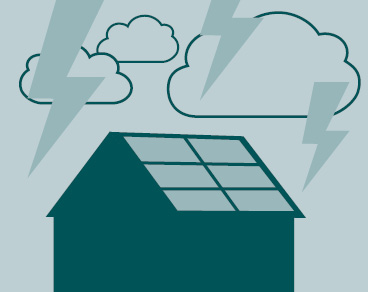Outdoor Safety
Additional Resources
Call Hawaiian Electric's Trouble Line at one of the following for assistance.
- Oahu: 1-855-304-1212
- Maui: (808) 871-7777
- Molokai and Lanai: 1-877-871-8461
- Hawaii Island: (808) 969-6666
Rooftop Solar Safety
Hawaiian Electric is committed to providing our customers with safe reliable service. With the growing number of rooftop solar systems, here are some tips to keep safety first (PDF).
Rooftop Solar Safety
- Do not touch solar panels and components. Assume they are energized. solar panels typically generate electricity directly from sunlight. However, panels may generate electricity while exposed to other sources, such as moonlight, fire, movie theatrical lighting.
- In the event of an emergency or fire: 1) Inform the 911 Operator that there are solar panels on the roof and whether they are solar water heating or PV; 2) Notify the first responders upon arrival that there are solar panels present and point out where the A/C disconnect switch is. This information is helpful for the first responders’ safety as well as for protection of your home and system;
- If you have battery storage for your rooftop solar system, be sure to have proper signage visible to alert the existence of a rooftop solar battery near the main switch breaker.
- Lithium-ion (Li-Ion) batteries, which are commonly found in energy storage systems, provide high energy density. They are more sensitive to physical stress than alkaline batteries and need to be treated with more care. Precautions are necessary to avoid fires, which may be caused by overheating, over charging, electrical shorting, etc. Be sure to read the manufacturer’s instructions on how to care for your batteries.
More Rooftop Solar Safety Tips
- In the event of a fire for rooftop solar systems with batteries or battery storage, do not handle, throw water on it, or inhale any possible fumes that may be emitted as they are flammable and toxic.
- Maintain your rooftop solar panels by having them inspected regularly to ensure that panels are clean, working efficiently, securely mounted and free of debris. Contact your solar contractor for advice on keeping your rooftop solar system properly maintained and in good condition.
- In the event your rooftop solar system is damaged in a storm or torn from your roof, do not touch a downed solar panel. For any issues related to damaged panels, contact your solar contractor and insurance company.
- For proper disposal of damaged panels, contact your solar contractor.
- Contact your solar contractor to keep informed about the latest technology to meet current safety standards.
These safety tips have been provided to you as a joint partnership from Hawaiian Electric and the Honolulu Fire Department.







